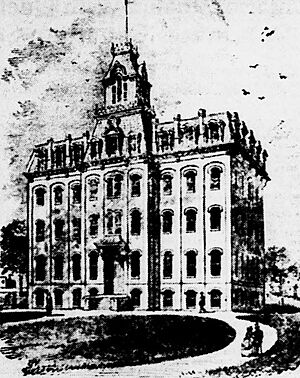Wayland Seminary facts for kids
Wayland Seminary was a special school in Washington, D.C. It was part of the National Theological Institute, which started in 1865. This institute was created by the American Baptist Home Mission Society (ABHMS). Its main goal was to help African American freedmen (people who were formerly enslaved) get an education and become ministers. Over time, the school offered more classes to meet the needs of these newly freed people. Near the end of the 1800s, Wayland Seminary joined with another school, the Richmond Theological Seminary. Together, they formed what is now Virginia Union University in Richmond.
Contents
Why Education Was Needed (1865)
By late 1865, the American Civil War had ended. Slavery in the United States was also over because of the Thirteenth Amendment to the United States Constitution. Millions of African Americans, known as "freedmen," were now free. However, many did not have job skills or even know how to read. For example, in Virginia, it had been against the law to teach enslaved people to read since 1831.
Many people realized that these newly freed individuals needed chances to learn. Members of the American Baptist Home Mission Society (ABHMS) suggested creating a "National Theological Institute" (NTI). This institute would educate those who wanted to become Baptist ministers. Soon, the plan grew to offer classes at college, high school, and even basic levels for both men and women.
Wayland Seminary in Washington, D.C. (1867–1897)
The National Theological Institute set up separate schools in Washington, D.C., and Richmond, Virginia. Another school, the Augusta Institute (now Morehouse College), also received support from the NTI. Classes started in both cities by 1867.
In Washington, D.C., classes were first held in the basement of the First Colored Baptist Church. This church was later renamed the Nineteenth Street Baptist Church. The classes grew into a school called Wayland Seminary. The school was named after Francis Wayland, a former president of Brown University. He was also a strong leader in the fight against slavery. A new building for Wayland students opened in 1875. It was located where Meridian Hill Park is today and was taken down around 1900.
The first president of Wayland Seminary was George Mellen Prentiss King. He was against slavery and led Wayland for 30 years, from 1867 to 1897. During his time, the Richmond branch of the National Theological Institute faced many challenges. Their first classes were even held in a building that used to be a "slave jail."
George Rice Hovey was the president of Wayland Seminary from 1897 to 1899.
Joining Forces: Virginia Union University (1899)
During the 1890s, there were plans to combine several ABHMS schools into one larger university. By 1899, it was decided that Wayland Seminary and Richmond Theological Seminary would merge. They came together to form Virginia Union University (VUU) in Richmond. New land was bought for a campus. Today, VUU's 84-acre campus is still located there, at 1500 North Lombardy Street in Richmond's North Side.
Famous Students of Wayland Seminary
Many students who attended Wayland Seminary between 1867 and 1897 became important African American citizens in the United States. Some of them include:
- Alfred L. Cralle, who invented the ice cream scoop.
- Kate Drumgoold, an author who wrote A Slave Girl’s Story in 1898.
- Henry N. Jeter, a minister in Newport, Rhode Island.
- Harvey Johnson, a pastor in Baltimore, Maryland and an early leader for civil rights.
- Robert S. Laws, a 19th-century Baptist pastor who started two churches that are still active today.
- Nellie Arnold Plummer, a teacher and author.
- Adam Clayton Powell, Sr., a pastor of the Abyssinian Baptist Church in Harlem, New York City. He was also a civil rights activist, speaker, and author.
- John Wesley Terry, a labor leader from Chicago.
- Booker T. Washington, a well-known educator and political figure.
 | Charles R. Drew |
 | Benjamin Banneker |
 | Jane C. Wright |
 | Roger Arliner Young |


